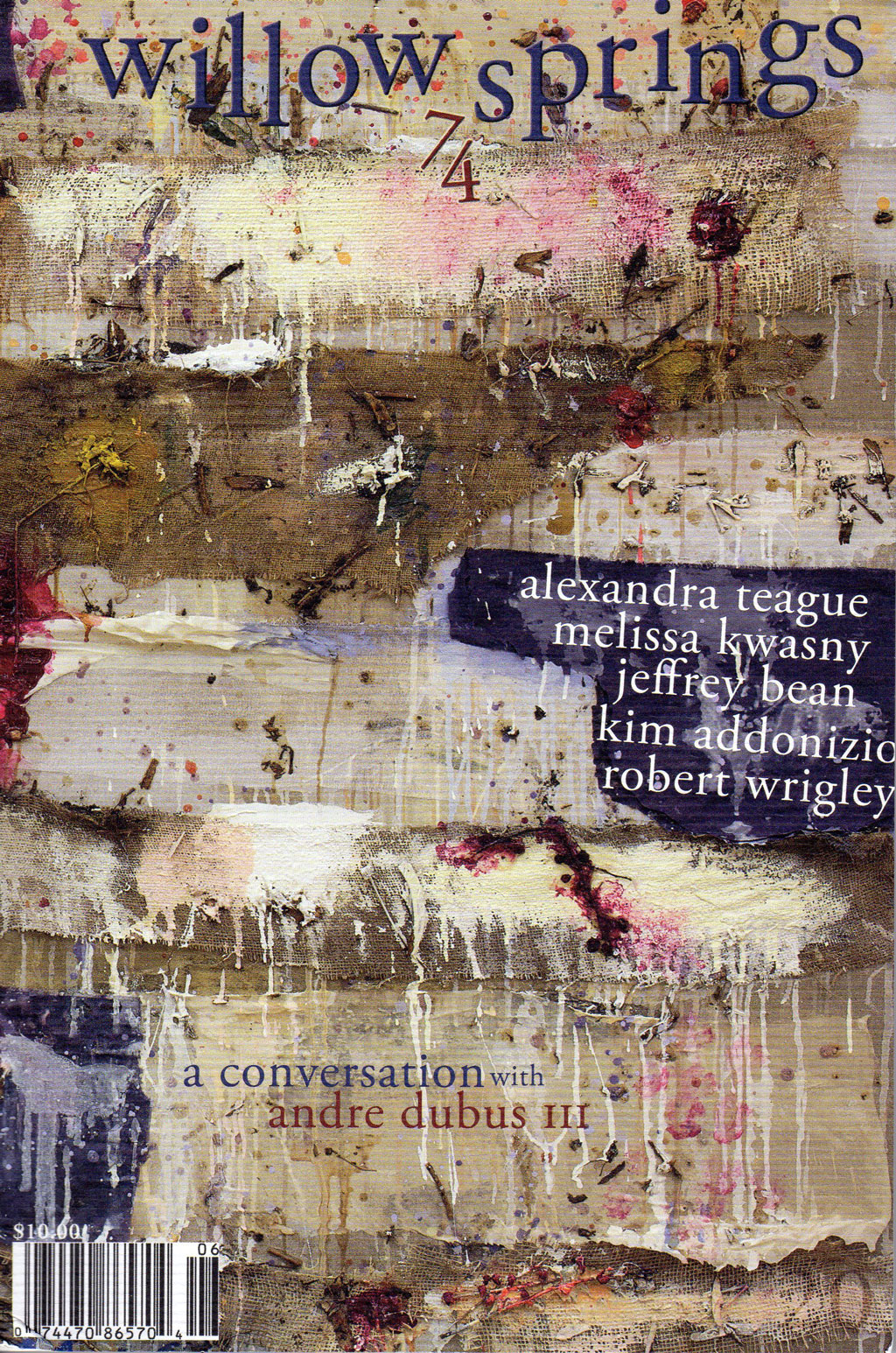Willow Springs – Fall 2014
Willow Springs has a thirty-year tradition of publishing fine contemporary fiction, nonfiction, and poetry. With this edition, the tradition continues with an impressive body of work. This is a strategically compiled collection, replete with recurring thematic and structural patterns. A striking feature in the issue is Jeffrey Bean’s series of “Voyeur” poems. The pieces, which comprise this series, are interspersed throughout the issue, presenting the speaker as voyeur. But his voice is not menacing or threatening. Instead, it is a gentle voice of longing and inquiry. Willow Springs has a thirty-year tradition of publishing fine contemporary fiction, nonfiction, and poetry. With this edition, the tradition continues with an impressive body of work.
This is a strategically compiled collection, replete with recurring thematic and structural patterns. A striking feature in the issue is Jeffrey Bean’s series of “Voyeur” poems. The pieces, which comprise this series, are interspersed throughout the issue, presenting the speaker as voyeur. But his voice is not menacing or threatening. Instead, it is a gentle voice of longing and inquiry.
These poems set a particular stage for the issue. For example, Bean’s sonnet “The Voyeur’s Prayers” explores the boundaries between absence and presence:
The nights you’re not there are the nights
I am best at wanting: when I leave my house
without leaving my house, when my face’s light
looms as calm as the moon’s, my shadow still as moss.What is it I want to see, watching your empty room,
your empty bed, your empty dresses flung down
on the floor? They remember where you’ve moved,
describe the shapes of you everywhere you’ve been . . .
The relationship between the voyeur and his beloved denotes the relationship between writer and reader, through which connection is achieved not only from the text, but also, from its suggested implications. This sense of perception is evident in the final couplet: “Now the moon’s high, and we both watch your chair. / You are and are not sitting there.”
The poem’s formal quality is characteristic of other poems in this issue in the way it attends strictly to form. A number of poems appear as sonnets, villanelles and other traditional forms, but even the free verse poems pay distinct attention to pattern and repetition.
Bean’s poem is also characteristic of others in theme. These poems play against the line that distinguishes absence from presence. They see through window curtains, beyond closed doors, past facades and first impressions.
Robert Wrigley’s “The Difficulty” asks us to look beyond the pretense of a photograph and question the perimeters of human kindness:
The picture in this morning’s newspaper
is of a trapped wolf in the snow.
in the foreground, smiling, the trapper,
between a circle—as far as the wolf could goagainst the radius of the trap’s chain—
of trampled snow, pinked with blood.
And here we readers are, reminded again
of the difficulty of being kind.
The poem examines what lives beyond the trapper’s pride and the wolf’s threat, what exists beyond the radius of the “circle of blood-stained snow.”
Like the poems in this issue, the prose pieces also challenge us to look beyond what we see, to look into what appears to be and what isn’t.
Each of the featured prose pieces centers on young characters. Jules Ohman’s nonfiction piece, “Model Girl,” explores a teenage girl’s life that exists beyond the cameras and glamorous photographs. Kim Addonizio’s “Intuition” also focuses on the life a teenage girl who presumably makes decisions based on intuition. The first-person narrator begins the story with an explanation:
When I see the boy at the movies, standing behind the candy counter in his striped shirt and paper hat, I know that we’ll be together. Not consciously, of course—it’s all my intuition. Intuition is about the unconscious, which is a murky weird place where shit happens that you’ll never begin to understand. It’s like a deep hole in outer space. Only it’s not cold and dead like it might sound. It’s like a tropical jungle, too, with things slithering down from branches and nosing through greenish water and running fast through leaves.
Of course, to the readers, the force that compels the narrator’s intuition is not quite so mysterious. As this book-smart fifteen-year-old consistently chooses inappropriate and unavailable romantic partners, we can see that the narrator’s trust in intuition is leading her in all the wrong places. We can also see the impact of her parents’ absence. The daughter of an overworked, preoccupied mother and a deadbeat dad who has been “out of the picture for three years,” the narrator attempts to fill the empty spaces her family has created by seeking attention and acceptance by those who reject her and further validate her loneliness. When her attempts to attain power through sex don’t work, she finds herself trailing after a childhood friend because she has nowhere else to go. The narrator’s parents are hardly mentioned in this story; however, their absence and neglect are a constant that remains with her from beginning to end.
A lengthy interview with Andre Dubus III concludes this issue of Willow Springs. In this interview Dubus discusses a number of topics, including his father, technology, writing rituals and the prayers of atheists.
Overall, the work in this issue is nothing less than excellent. It should appease the voyeur in us all.
[www.willowsprings.ewu.edu]





